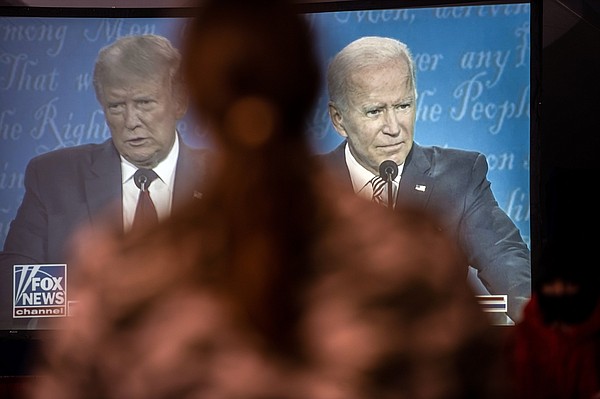The Biden and Trump campaigns have agreed to hold two presidential debates. Who among us can contain our excitement?
Well, it depends on what you mean by “we.” In my own pundit world – pundits, commentators and political geeks – there was great jubilation, and watching the programmes on Sunday, you'd be forgiven for thinking that church bells must have been ringing across the country to celebrate the news as if a medieval queen had given birth to a boy.
Meanwhile, among normal people, the sound you didn't hear was the sound of many people shrugging their shoulders.
Now we understand why journalists and geeks are excited. For one, presidential debates inflate journalists' egos and give them ample opportunity to pontificate about the important role of the fourth estate in a democracy. They also have a positive impact on ratings: the first debate of 2020 was abysmal, yet 73 million people tuned in.
The drama of politicians giving unscripted (though often rehearsed) answers to complex questions has a Super Bowl feel for political nerds. Listening to either of the current front-runners is like watching a race car driver get behind the wheel of a car with no brakes, only more exciting. There's always a certain dark allure to the prospect of a spectacular clash, and in a Trump-Biden matchup, a clash is a certainty.
What's being forgotten in all the furore over the latest debate agreement is the fact that almost all presidential debates are boring, unproductive spectacles.
The first presidential debate took place in 1960 between John F. Kennedy and Richard Nixon (Biden and Trump were 17 and 14 years old, respectively). The only debate that everyone remembers is the first one. Legend has it that Nixon lost because he was wearing no makeup, unshaven, and sweaty. Legend has it that people who listened to the debate on the radio thought Nixon won, but people who watched it on TV were impressed by Kennedy's sophisticated style and good looks and thought he won. Nixon was skinny and exhausted in the first debate, but he rested, put on a lot of makeup, and won the next two debates, but no one remembers that.
In other words, the lesson from the beginning has been that style is more important than content, and always has been.
We think that TV debates convey important information to voters because we hear it over and over again. But TV, often subconsciously, makes certain information seem more important than it actually is. For example, in most presidential elections, the tallest candidate wins. Does height somehow correlate with better policies?
Of course, television appearances are part of the job description of a modern president. But televised presidential debates elevate the qualifications beyond all measure. Yes, yes, a president needs to be a good communicator. But the actual presidency never requires a president to spar with a political opponent for 90 minutes in front of millions of people.
The political skills we test are not the political skills required for the job. Candidates who lie forcefully, confidently, or entertainingly tend to thrive in debates, while candidates who tell the truth awkwardly, tentatively, or with moderate complexity tend to fare worse.
The television “highlights” reels that the networks routinely show from the debates are filled with one-liners, gaffes and falsehoods that sympathetic journalists often treat as truth, but I have never seen a truly thoughtful explanation of the national debt or any other serious issue that is hailed as a great moment in debate history.
While the prospect of a Biden-Trump rematch is especially worthy of a “What? Really?”, the truth is that every presidential debate deserves the same shoutout.



